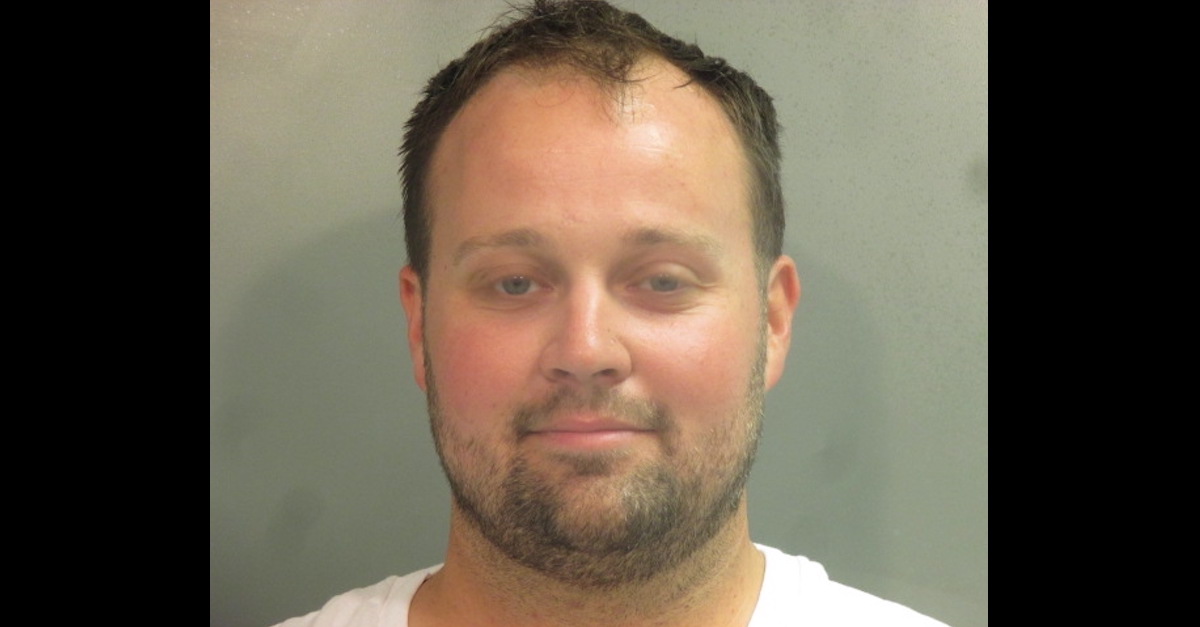
Federal prosecutors must turn over information to Josh Duggar’s legal team about whatever role two Arkansas police departments may have played in downloading the illicit files authorities allegedly traced to the disgraced ex-“19 Kids and Counting” star, a judge ruled on Thursday.
The victory for Duggar’s defense attorneys may prove to be of dubious significance—or even Pyrrhic.
“Either Exculpatory or Inculpatory”
Prosecutors deny that the information Duggar wants exists, and even if it did, the relevance would be disputed. Duggar’s lawyers acknowledge that the sought-after data could be “either exculpatory or inculpatory,” the judge noted.
The ruling allows Duggar to learn more about the nascent stage of the investigation in the spring of 2019, which ultimately led to his indictment earlier this year.
In May 2019, members of three Arkansas police departments—Little Rock, Jonesboro and Ozark—downloaded files depicting childhood sexual abuse from proprietary law enforcement software called “Torrential Downpour.” The Little Rock detective passed on the lead to federal investigators from Homeland Security Investigations, which allegedly traced to former reality TV star and devout Christian, Josh Duggar.
Duggar wanted more information about two of the local police: Jonesboro Detective Brandon King and Ozark Officer David Warren. Prosecutors insist the officers played no role in this investigation.
Either way, U.S. District Judge Timothy Brooks ruled, Duggar should be able to obtain logs of their work.
“The Court appreciates the fact that the Little Rock, Jonesboro, and Ozark police officers were not conducting a coordinated online investigation and coincidentally downloaded the same files from the same IP address at approximately the same time,” the nine-page order states. “Nevertheless, the defense has persuaded the Court that the auto-generated logs emailed to the three officers could disclose information to the defense that may be either be exculpatory or inculpatory.”
Prosecutors claim that Jonesboro and Ozark authorities have no logs or reports from those downloads, but Duggar’s legal team says the Torrential Downpour program logs that information automatically. So, the judge’s ruling may order the government to turn over a null set.
“The Court therefore directs the Government to accomplish this task and obtain the logs to produce to the defense,” Brooks wrote. “If the logs do not exist, then the Government should inform the Defendant of this fact.”
“Within Minutes of Each Other”
Little Rock Detective Amber Kalmer’s key role in the investigation that ultimately led to Duggar’s charges is undisputed, and she says that she found a BitTorrent user sharing horrific files: a “.zip” folder and another as a video. Both allegedly depicted prepubescent girls, between the ages of seven and nine, being sexually abused (Law&Crime previously reported on the horrific details here).
Geolocating the files to Northwest Arkansas, Kalmer sent the lead to Homeland Security Investigation Agent Gerald Faulkner, who ultimately accused Duggar of being the sender. That two other law enforcement organizations downloaded the files at roughly the same time is said to be a coincidence.
“During the motion hearing, the government stated that all three police officers downloaded the same child sexual abuse files from the same IP address within minutes of one another—but in the course of pursuing unrelated investigations—and that only Detective Kalmer, and not the other two officers, made contact with HSI Special Agent Faulkner to pursue a federal investigation of these downloads,” Judge Brooks wrote.
Agent Faulkner obtained a warrant on November 4, 2019.
Some four days later, Faulkner executed the search and testified that he found more images and videos showing childhood sexual abuse on devices inside Duggar’s auto dealership.
During a May hearing, Agent Faulkner called one notorious file the “Top Five worst of the worst” he ever had to examine, as it depicted the abuse of an 18-month-old toddler. The man who made the file, convicted Australian human trafficker Peter Scully, is serving a life sentence in the Philippines.
The investigation took long to run its course: Duggar would not be indicted until April 2021, and his trial is scheduled for late November.
Duggar’s lawyer did not immediately respond to an email requesting comment.
Listen to Law&Crime’s podcast looking into the history of Duggar’s worst alleged download:
Read the ruling below:
(Image via mugshot)